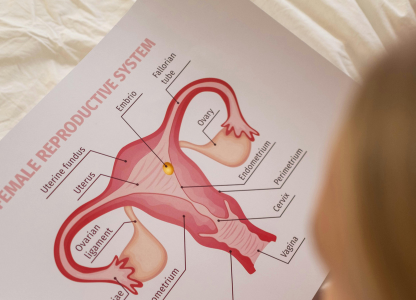
Vaginismus – What Your Body Is Trying to Tell You
Our bodies have a way of telling us when something isn’t quite right. But sometimes, the messages can be confusing like in the case of Vaginismus (also known as genito-pelvic pain/penetration disorder). Let’s break it down, so it’s easier to understand what’s going on and how to address it.
What Is Vaginismus?
Vaginismus happens when the muscles around the opening of the vagina tighten on their own. This can make activities—like inserting a tampon, undergoing a medical exam, or having sexual intercourse—uncomfortable or even painful. The tightening of these muscles is automatic, much like blinking when something gets close to your eye.
Why does Vaginismus Happen?
You can think of Vaginismus as your body trying to protect you from something it sees as harmful or uncomfortable, even if it’s not interpreting the situation correctly.
Here are some possible causes of Vaginismus:
Fear or Anxiety
If you feel scared or nervous about sexual intimacy, your body may react by tightening the vaginal muscles. This is its way of saying, “I’m not ready” or “I’m scared this might hurt.”Past Experiences
Your body remembers; difficult experiences like sexual trauma, a painful medical procedure, or even a bad first sexual experience can leave an imprint. Vaginismus could be your body’s way of saying, “I need to feel safe before I can relax.”Medical Issues
Pain caused by conditions such as infections, hormonal changes, or menopause can trigger vaginismus. It’s your body’s way of saying, “Something doesn’t feel right down here; please pay attention.”Lack of Information
Vaginismus may be your body’s way of saying, “I’m unsure of what’s happening, and I’m protecting myself just in case.” When you do not know much about your body or if you’ve grown up hearing negative messages about sex, it can create tension, fear or even shame.
Your Body Is Talking—Listen With Kindness
Vaginismus is not a sign of weakness or something to be ashamed of. While this experience can be confusing or frustrating for you and your intimate partner, it’s essential to approach it with kindness and curiosity. By listening to these signals, you take the first step toward healing.
What Can You Do If You Have Vaginismus?
If you think you might have vaginismus, the good news is that there are many ways to treat it. Here’s what you can do:
Talk to a Doctor
A sexual health expert can help you understand what’s happening and guide you through treatment, especially for vaginismus triggered by medical conditions.Try Pelvic Floor Exercises
These exercises can help relax the muscles around the vagina. You can work with a physiotherapist who specializes in pelvic health to learn how.Explore Therapy
If anxiety, fear, or past experiences are contributing to vaginismus, talking to a therapist or counsellor can make a big difference. They can help you process emotions.Use Medical Tools
There are tools such as gel sticks and dilators that come in different sizes and can be used to gently stretch and relax the vaginal muscles over time. They are often used alongside therapy or exercises.Educate Yourself
Learning about your body can be empowering. When you understand how your body works, you can replace fear with knowledge and confidence.
Remember, seeking support is a sign of strength. You deserve to feel empowered in your intimate relationships. Take that first step towards your healing—you’re worth it.
Ready to embark on your sexual wellness journey? Book a consultation with our multidisciplinary team and we’ll take care of the rest.
Disclaimer: The information above is for informational purpose and is not intended as personal medical advice.


